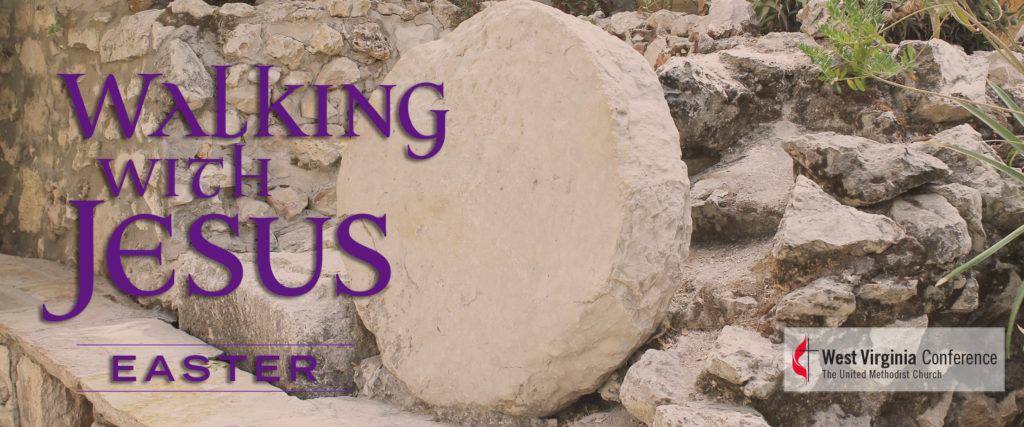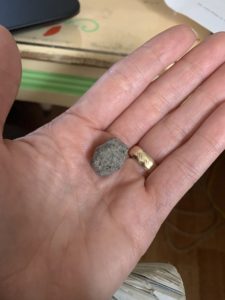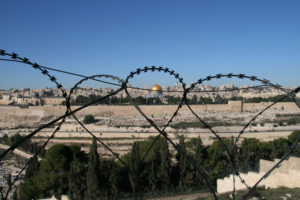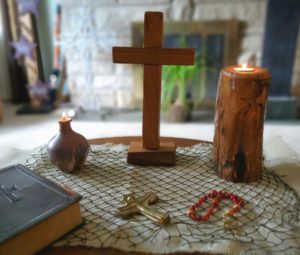
The 5th Sunday of Easter
The church grows through sacrificial love and endures because of faith in our living God.
The lectionary readings for this Sunday are: John 14:1-14, Psalm 31:1-5, 15-16 1 Peter 2:2-10, Acts 7:55-60
Rev. Lisa Fox
Dallas/Sand Hill UMC
Northern District
1 Peter 2: 2 – 10
After reading 1 Peter 2: 2 -10, I was reminded of one of the gifts I brought home from Israel. When I was preparing to leave for my trip, I made a list of friends and family I wanted to buy gifts for from my travels. My Aunt Janice from New York was one of those people. The last conversation I had with my aunt before leaving on my trip, she had humbly stated: “Lisa, you don’t need to bring me back anything, but if you insist (which I was) please just bring me home a small stone you find along your journey that would fit in the palm of my hand.” I was excited for this challenge of finding a stone to bring home from Israel that would fit perfectly in the palm of my aunt’s hand! And so, as I walked throughout Israel, I kept my eye open for this perfect stone.
Our tour guide in Israel was a Christian woman named, Rula Shubeit. Rula was beautiful and gracious and full of wisdom. Our bus driver was a man whose nickname was Elvis, because he looked like Elvis with his thick, black hair. As we traveled the countryside, we passed green hills and desert, the Mediterranean Sea and fruit trees. The closer we came to Jerusalem the landscape turned to stone. The city of Jerusalem is basically a city made of stone. We passed many buildings made of chalky, pink colored limestone. Rula called the stone used for building material the Jerusalem Stone. The churches we visited were all built out of beautiful stone. In the Church of the Holy Sepulchre, marble was used when they built the church to protect Jesus’ tomb. When I visited the Western Wall, I stuck a small piece of paper that had prayers written on into the cracks between the stones of the wall. Throughout my journey, I was surrounded by stones.
The first small stone I found, I held in my hand as I walked. I would sit and talk as I rubbed the rock with my thumb, smoothing it, considering the stone as a gift for my aunt. Ultimately, I wasn’t satisfied and left the rock behind. I was searching for the perfect one. I did this several times throughout my journey, until I arrived at the Sea of Galilee. Among the many small shells on the shore of the Sea of Galilee, I found my aunt’s gift. It was a small, grayish colored rock, it wasn’t completely round and it had a small crack on one side, but as I held it in my hand, I saw the beauty in this humble stone. I envisioned my aunt using this stone as a prayer rock or perhaps as a visual reminder of the body of Christ.
I would sit and talk as I rubbed the rock with my thumb, smoothing it, considering the stone as a gift for my aunt. Ultimately, I wasn’t satisfied and left the rock behind. I was searching for the perfect one. I did this several times throughout my journey, until I arrived at the Sea of Galilee. Among the many small shells on the shore of the Sea of Galilee, I found my aunt’s gift. It was a small, grayish colored rock, it wasn’t completely round and it had a small crack on one side, but as I held it in my hand, I saw the beauty in this humble stone. I envisioned my aunt using this stone as a prayer rock or perhaps as a visual reminder of the body of Christ.
In 1 Peter 2: 4-5, Peter describes the church not as a building built by human hands, but a divine house built on the living stone, Jesus. He’s the strong, foundational building block of the church, and his followers are living stones who are being built into a spiritual house. Just like the stone I brought home for my aunt, I am one of many little living stones in the church. Each member of the church is a unique stone that has great worth to Jesus and to his body. Sadly, at times many of God’s children have been rejected, like Jesus. Many people have been disregarded, like the stones I discarded along my journey of trying to find the perfect one. Sadly, stones have been used as weapons and materials to build walls to keep people out. In the poem, “Picking up Rocks” by Palestinian poet Rash Abdulahdi, she writes: “I have been trying to put that rock down, I have tried to put it down every night, tried to set it down in stone mornings quarried – out of fear, nausea, and despair, but every afternoon the daily news puts it there, that weight rolling along on the shoulders of everyone I know, everyone on this train ride home and falling sometimes so I keep picking up rocks and putting down stones in the shape of a sanctuary …”. There are times when we are tempted to ignore the need of others or reject those who appear to be different than us.
Peter writes how we are “a chosen priesthood, a holy nation, God’s special possession, that you may declare the praises of him who called you out of darkness into his wonderful light.” (vs 9) That day on the shore of the Sea of Galilee, I found a gift for my aunt and also a gift for myself. Today, that stone reminds me that God did choose me to be holy and this holiness produces the kind of spiritual fruit that can be seen and felt: love, peace, faithfulness, joy, goodness, gentleness, patience, self-control, and kindness. Now more than ever, the world desperately needs to see the church in action. We must always remember that each stone is balanced by all those around it, and all rest on the living Stone himself.
Rev. Jonathan Nettles
Christ-St Andrews UMCs
Little Kanawha District
If Only… the Pathway to Peace
Acts 7:55-60 (ESV)
55 But he, full of the Holy Spirit, gazed into heaven and saw the glory of God, and Jesus standing at the right hand of God.
56 And he said, “Behold, I see the heavens opened, and the Son of Man standing at the right hand of God.”
57 But they cried out with a loud voice and stopped their ears and rushed together at him.
58 Then they cast him out of the city and stoned him. And the witnesses laid down their garments at the feet of a young man named Saul.
59 And as they were stoning Stephen, he called out, “Lord Jesus, receive my spirit.”
60 And falling to his knees he cried out with a loud voice, “Lord, do not hold this sin against them.” And when he had said this, he fell asleep.
Stephen was called to free up the apostles by supervising the aid given to Greek-speaking widows. He was chosen because he was full of the Holy Spirit and faith. We also read Stephen was full of grace and power, performed great wonders and signs, and taught with irrefutable wisdom. He clearly went far beyond caring for the widows.
The Jewish religious institution of the day was very resistant to change. They didn’t like to be challenged, and they weren’t open to having their beliefs or actions questioned. Stephen calls them to account for their hardness of heart, and for their role in the betrayal and murder of Christ. They were enraged, and when he shared his vision of Jesus standing at the right hand of God, they closed their ears and murdered Stephen.
It’s not just the Jews, religious institutions have always been resistant to change or correction. Martin Luther’s ninety-five theses (against the practice of indulgences in the Roman Catholic Church) were a reasonable call to much needed reform, but the church was unwilling. John Wesley’s departure from standard practice in the Church of England offered much hope and a new direction, but they were also unwilling. Many institutions default to believing they are right and avoiding change, and churches are not immune.
I clearly remember standing outside the Dominus Flevit Church (the cry of the Lord) on the Mount of Olives. This church commemorates Jesus weeping over Jerusalem (Luke 19:41-44.) Jesus’ words continue to haunt me. “…If you, even you, had only known on this day what would bring you peace—but now it is hidden from your eyes… you did not recognize the time of God’s coming to you.” I took the photo from this site looking at Jerusalem through the razor wire, and it seems to capture the sense of “if only” contained in Jesus’ words. During my pilgrimage in Israel countless people requested that I “pray for peace.” I believe we are all tired of the brokenness, and we long for that same peace.
I took the photo from this site looking at Jerusalem through the razor wire, and it seems to capture the sense of “if only” contained in Jesus’ words. During my pilgrimage in Israel countless people requested that I “pray for peace.” I believe we are all tired of the brokenness, and we long for that same peace.
There have always been those like Stephen, those who are open to the Holy Spirit and clearly see those life-giving truths that could lead us in a new direction. We may not stone them, but all too often we still find ways to silence their voices. We and our institutions can get so caught up in what is, and so threatened by significant change, that we fail to ever really open ourselves to what could be. I believe Jesus often weeps and laments over us as he did over Jerusalem. As he looks at many of the struggles in our world, our churches, and our lives – I believe he still longs for us to recognize the things that make for peace and to see where God is at work.
I’m having a hard time with social distancing and staying at home. The normal rhythms have disappeared and so much is uncertain. My emotions are on a roller coaster ride, and it’s hard to get them leveled out. Yet I think this may be a much-needed gift. It seems like most of us were running so hard, and there was little time to slow down and reflect. Often when I’ve found those times, I still failed to get to a place of inner peace and stillness. I know God is able to use this time for good in our lives and our churches, and I pray that we will open ourselves and invite him to do just that. There is a high cost to what we are experiencing, but I hope we can return to a new normal as better people ready to help grow a better world.
As I light my candles and sit to pray and listen, I long to be one of those people who is more fully open to the Holy Spirit and can more clearly see the life-giving pathways to peace.  I’m slow to catch on at times, and I so easily get distracted and miss what God is doing, yet I can reach for more. And, at the very least, I hope and pray that I will have the openness and humility to recognize and welcome those, like Stephen, sent by God to help us find our way.
I’m slow to catch on at times, and I so easily get distracted and miss what God is doing, yet I can reach for more. And, at the very least, I hope and pray that I will have the openness and humility to recognize and welcome those, like Stephen, sent by God to help us find our way.